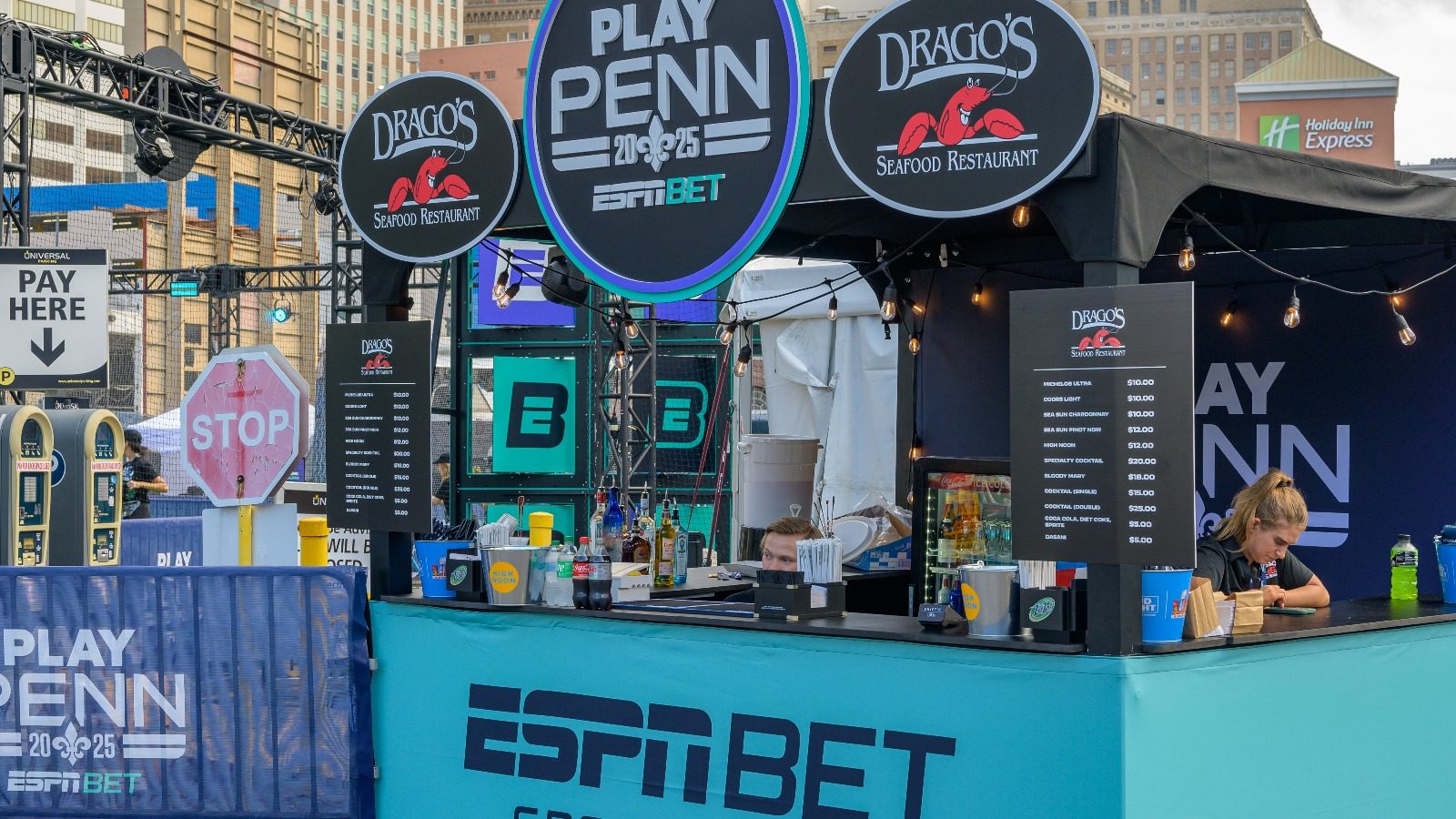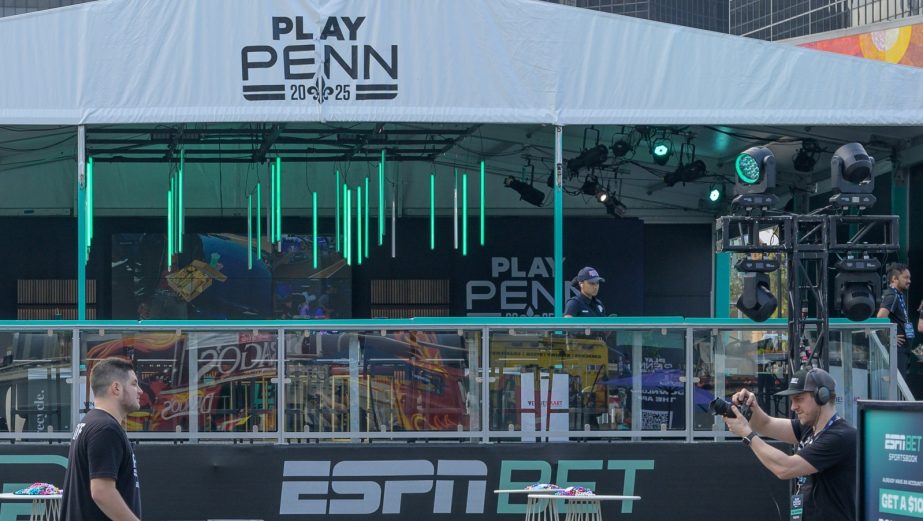ESPN Bet will be no more in a matter of weeks, as Penn Entertainment and ESPN have canceled their $2 billion partnership, the companies revealed in a press release Thursday.
The partnership will end on Dec. 1, a month before the end of the NFL regular season. From that point on, Penn will rebrand the ESPN Bet app as theScore Bet, taking the name of the Canada-founded sportsbook that Penn acquired in 2021.
The Penn-ESPN partnership was first announced in 2023. Under the deal, Penn would pay $150 million per year for 10 years, plus warrants to buy Penn stock that bumped the value of the deal up to $2 billion, for the right to use the ESPN name and branding. However, ESPN Bet struggled to ever gain significant market share. According to Casino Reports’ sports betting database, ESPN Bet made up only 2.6% of the online sports betting market in August and has been hovering around that level since mid-2024.
The deal included a provision to terminate the agreement after the third year if specific market share performance thresholds were not met, though it turns out the termination is happening sooner.
“When we first announced our partnership with ESPN, both sides made it clear that we expected to compete for a podium position in the space,” Penn CEO Jay Snowden said. “Although we made significant progress in improving our product offering and building a cohesive ecosystem with ESPN, we have mutually and amicably agreed to wind down our collaboration.”
Penn focuses on areas of strength
Snowden said Penn will refocus on the company’s areas of strength, including Canada — where Penn already operates under the theScore Bet brand — and online casino. The focus on online casino at the expense of U.S. sports betting was one of the requests made by activist investor HG Vora, which holds two seats on Penn’s board and has been locked in a battle with management over a third.
“PENN’s unique omnichannel strategy is anchored in a diverse portfolio of market-leading regional casinos and a complementary digital business,” Snowden said in the press release. “We are realigning our digital focus to leverage the strength of our U.S. iCasino and Canadian operations, while continuing to use OSB [online sports betting] to drive both the acquisition of customers with significant lifetime value and unique cross-sell opportunities across PENN’s retail and digital assets.”
Snowden added that Penn was also planning to reduce spending on major ad buys, replacing it with “performance-based” marketing.
“Our OSB offerings will continue to provide top of funnel acquisition and cross-sell opportunities for our Hollywood-branded iCasino, which will remain integrated into our OSB product in states where legal, in addition to serving as a standalone iCasino app. We will operate with a more efficient cost structure, including replacing fixed media spending with performance based and regionally targeted marketing that complement our casino footprint.”
Jimmy Pitaro, chairman of ESPN, said in the release, “Together, ESPN and PENN created a truly unique offering with unparalleled integrations across our various media assets. ESPN drove over 2.9 million new users into the PENN ecosystem, with a strong uptick in first time bettors this fall. We appreciate the collaboration we had with PENN and are now pursuing other media and marketing opportunities within this space.”
ESPN will still have warrants to purchase almost 8 million Penn shares, at a price of $28.95. Penn shares were trading at $16.35 when the termination was announced, meaning that they would have to rise by almost 80% for the warrants to be worth executing. ESPN will not receive warrants that have not yet vested.
The ESPN deal followed a tie-up with Barstool, which also ended after failing to win a significant portion of the market. Penn bought Barstool for $551 million, getting a stake in 2020 and the rest of the company in February 2023, only to sell it back to founder Dave Portnoy in August 2023 for a dollar.
One hour after the Penn-ESPN Bet announcement, at 8 a.m. ET Thursday, ESPN announced a new multi-year deal with DraftKings to be “the official sportsbook and odds provider of ESPN,” effective Dec. 1.
$825M write-down hits bottom line
The announcement came alongside Penn’s third-quarter results. In terms of adjusted earnings before interest, taxes, depreciation, and amortization (EBITDA), the digital business — including both online sports betting and iGaming, across the U.S. and Canada — recorded a loss of $76.6 million, moderately lower than the $90.9 million loss a year earlier.
Revenue was lower than expected, at $297.7 million, partly due to “customer-friendly” sports results, as well as “lower than anticipated” betting volume.
The company as a whole made $1.72 billion in revenue for the quarter, up 4.7% from 2024, with adjusted EBITDA of $194.9 million.
However, the company had to write down the value of its interactive division because of the end of the ESPN deal. When the $825 million non-cash loss on that write-down — as well as other non-recurring costs — is included, Penn made a net loss of $865.1 million over the three-month period, a 23-fold increase from its loss in the third quarter of 2024.
The company also announced a $750 million share buyback — aligning with another HG Vora demand. Penn will buy back the shares between 2026 and 2028, returning more money to shareholders.
Penn previously warned that a large share buyback program could cause its leverage — its ratio of debt to assets — to get too high, once rent is accounted for.
Snowden: making money wasn’t only goal
On Penn’s third-quarter earnings call, Snowden appeared to downplay the significance of ESPN Bet’s underperformance from a market share perspective, arguing that the major goals of the company’s online investments were in providing a way to complement Penn’s land-based casino business.
“As you think about the investments that we’ve made in our digital business over the last five years, we really had four primary goals.
“We knew that getting into the digital business, primarily sports betting, would be a great top of the funnel. It would be an opportunity for us to really bring the average age of our database down. We’ve been successful in doing that. The average age of our active database is younger by seven years. That was goal one.
“Number two, once we have those younger customers and new customers in your database, you want to be able to cross-sell them to your land-based database. And that’s been very successful. So check that box.
“And I think number three for us is that we wanted to make sure that we were preparing for the future and we’re set for where this industry is headed. There’s a lot going on in this industry right now and we’re under attack from a lot of different directions, but I think Penn is ready to compete no matter what direction this industry goes. So I would say check the box.
“And then lastly, I suppose, we made these digital investments to make money, and they have not done that.”
App will carry over with new branding
Snowden added in the earnings call that the transition from ESPN Bet to theScore will all happen automatically, without users needing to download a new app.
“ESPN Bet will be automatically updated to theScore Bet on the date of transition,” Snowden said. “All account information, balances, betting history, betting bets, marketing offers, and promotions transfer over automatically. There will be no new app to download or registration process to go through.”
Snowden added that the process should be smoother than the transition from Barstool Sportsbook to ESPN Bet.
“It’s the same exact app,” he said. “You’ll show up, the icon will change but once you’re in it, the user experience will be exactly the same. So we feel really strong and confident that people will still have the same experience.”
Snowden on prediction markets
On the earnings call, Snowden also discussed prediction markets, saying that licensed sportsbook operators need to be more proactive in challenging the rise of the new vertical.
“My view on prediction markets is that this is a major threat to the industry,” he said. “To use the same canned line as everyone else, we’re monitoring the situation, and we’re taking our direction on that from state regulators.
“But I do think as an industry we have to play some offense here. That means working with legislators and state lawmakers. Because the posture we’re taking here is very defensive and it doesn’t feel like the winning hand.
“Prediction markets are live across the country. And as an industry, we believe we can outcompete them if we’re in the same markets with sports betting. But where they are doing business in states where it’s not legal, at least at the state level, and how does that play out in the courts — it’s going to take years.”
He added that he wouldn’t be surprised if prediction markets soon started infringing on casino territory as well.
“You look at what Hard Rock’s doing in Florida, with past motor racing,” he said. “Let’s be honest about this, I would be shocked if prediction market operators, raising money at ridiculous valuations, aren’t talking about this. If you’re offering sports betting on prediction markets, what’s stopping you from offering markets on the next spin of a slot machine, the next spin of a roulette wheel, the next hand of blackjack?”
Penn shares decline
Penn shares declined in early trading Thursday, though it was hard to separate the impact of ending the deal from reaction to the company’s third-quarter results. Shares were down 2.7% to $15.91. Shares are down 30% since August 2023, when the ESPN deal was announced, and more than 90% from their peak in 2021.
Shares in DraftKings rose slightly — after more than two months of steep declines — to $28.24.








